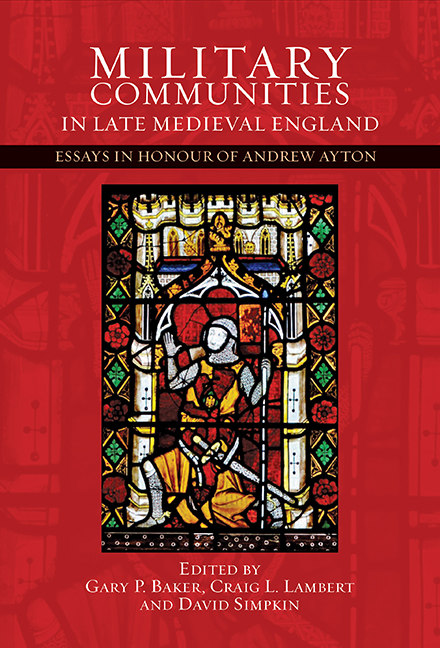Book contents
- Frontmatter
- Miscellaneous Frontmatter
- Contents
- List of Illustrations
- Acknowledgements
- List of Contributors
- Foreword
- Andrew Ayton: A Brief Tribute
- Andrew Ayton: A Recognition of his Work
- Abbreviations
- Part Title
- Bibliography of the Writings of Andrew Ayton
- Index
- Tabula Gratulatoria
- Warfare in History
Foreword
Published online by Cambridge University Press: 17 July 2019
- Frontmatter
- Miscellaneous Frontmatter
- Contents
- List of Illustrations
- Acknowledgements
- List of Contributors
- Foreword
- Andrew Ayton: A Brief Tribute
- Andrew Ayton: A Recognition of his Work
- Abbreviations
- Part Title
- Bibliography of the Writings of Andrew Ayton
- Index
- Tabula Gratulatoria
- Warfare in History
Summary
Andrew Ayton is one of the most distinctive voices in the field of late medieval military history. His speciality has been to apply the prosopographical method to the study of the English armies of the fourteenth century using research methodologies developed in the social sciences. Where past scholars have either constructed simple campaign narratives or analysed changing battle tactics, and where students of politics have examined the interaction of war and society, Andrew has looked instead at those underlying structures which he considers crucial to a medieval army's effectiveness in the field. Drawing on his extensive database of combatants, compiled from such sources as pay rolls, horse inventories and letters of protection, he has brought a new sophistication to the study of retinue recruitment and composition, and to the interaction between campaign retinues and the society from which they were drawn. A key concept of his is that of the ‘military community’, a term he first coined (drawing inspiration from the work of Philip Morgan on late medieval Cheshire) in 1994 to describe that pool of manpower drawn largely from the ranks of the landed classes and coterminous with the political groupings from which the mounted warriors were recruited. The military communities, Andrew argues, were endowed with a quality of stability, born of the steady accumulation of memory and experience, which helped to counter the inherent instability of campaign retinues, companies that by their nature were ephemeral entities with a life of only a few months or more. For Andrew, an Edwardian army was not simply a military machine; it was a living organism, a social and institutional network, the effectiveness of which was largely dependent on ties between the great captains, the organisational hubs of the army, and the informal local networks into which they tapped. Lacking a permanent institutional structure of its own, the army was held together by the social authority and resources of its principal commanders and their relationships with the men in their retinues. In the field, the force's effectiveness would depend largely on the individual commander's authority and on the day-to-day relations between his immediate lieutenants. Where either the first was lacking or the latter weakened by rivalries and jealousies, the army's operational capability would be jeopardised or even lost altogether.
- Type
- Chapter
- Information
- Military Communities in Late Medieval EnglandEssays in Honour of Andrew Ayton, pp. xiii - xvPublisher: Boydell & BrewerPrint publication year: 2018



